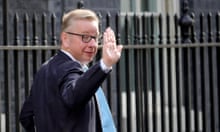Europe has reacted furiously to Boris Johnson’s appointment as the UK’s foreign secretary, with the French and German foreign ministers respectively calling him “a liar with his back to the wall” and someone whose behaviour has been “outrageous”.
Senior European politicians made little effort on Thursday to hide their disgust at Johnson, whom they blame for Britain’s vote to leave the EU. Their anger is fuelled by the widespread perception that he cynically lied to the British public about Brexit and dodged responsibility in the immediate aftermath.
France’s foreign minister, Jean-Marc Ayrault, who met Johnson when the two men were both mayors, was asked on French radio if he was surprised by Johnson’s appointment. “I don’t know if it surprised me,” he said. “It’s a sign of the British political crisis that has come out of the referendum vote.”
He said France needed a partner it could negotiate with who was “clear, credible and who could be trusted”. The Europe 1 radio interviewer told Ayrault: “I’ve got the impression you’re scared of being faced with the fanciful Boris Johnson?”
Ayrault replied: “No, I’ve got no worries at all about Boris Johnson. But you know very well what his style and method are. During the campaign, you know he told a lot of lies to the British people and now it is him who has his back against the wall. He is up against it to defend his country and also so that the relationship with Europe is clear.”
Ayrault said Brexit must now happen in the best conditions possible “and not to the detriment of the European project”. He added: “We cannot let this ambiguous, blurred situation drag on.”
In Berlin, there was dismay. Germany’s foreign minister, Frank-Walter Steinmeier, echoed the French critique of Johnson, suggesting that his conduct in the run-up to the EU referendum was deceitful and reckless. Speaking in Greifswald, Steinmeier called the new foreign secretary’s behaviour “ungeheuerlich” - egregious or outrageous.
“People [in the UK] are experiencing a rude awakening after irresponsible politicians first lured the country into Brexit and then, once the decision was made, decided to bolt from responsibility, and instead go off and play cricket,” Steinmeier said. He was referencing Johnson’s decision the day after the vote to play cricket at the Althorp estate, the stately home of Earl Spencer.
Steinmeier added: “To be honest, I find this outrageous. It’s not just bitter for Great Britain. It’s also bitter for the EU.”
In a blogpost, the European commission vice-president, Frans Timmermans, said he was a passionate anglophile. But he said the “hatred and bigotry” unleashed by the leave campaign “took me completely by surprise” and added that he was stunned Johnson brought the Nazis into the debate. In May Johnson likened the EU to a project by Adolf Hitler.
Timmermans also cited Johnson’s claim the previous month that Barack Obama held a grudge against Britain because of his “half-Kenyan ancestry”.
“Would it not have been enough to say that you disagree with the American president’s point of view? Why discredit not just his motives, but even his persona, with borderline racist remarks?” Timmermans wrote.
He went on: “The problem with hatred however is that, once used casually as an instrument in political discourse, it can prove very effective in reproducing itself. Of course this loss of control doesn’t happen when one is simply debating big topics with the chaps at the Oxford Union … But in the real world of a referendum on the future of your country the kind of arguments used have consequences.”
Elsewhere in Germany the reaction was negative. Simone Peter, the co-leader of the Green party, compared Johnson’s new job to “trusting the cat to keep the cream”. The former London mayor was “properly, properly hated”, said Anne Gellinek, the Brussels correspondent of public broadcaster ZDF.
In Brussels – where Johnson is due to attend his first foreign ministers’ summit on Monday – there was a distinct lack of enthusiasm. Martin Schulz, the European parliament chief, said Theresa May’s new cabinet was based on solving internal Conservative party problems. It continued a “dangerously vicious cycle” that will hurt Britain and Europe, Schulz said.
“It its important to have someone in place who allows for calm and serene negotiations,” added one EU diplomat. “These are not the qualities we have seen from Boris Johnson so far.”
In Paris, Johnson has long been seen as an outrageous “French-basher” and bizarre English eccentric, once summed up by Le Monde as “a Monty Python-style politician who appears to avoid taking things seriously”.
His appointment was met with a degree of appalled surprise from French media and commentators, many of whom had been shocked by what was seen as the intellectual dishonesty of some of Johnson’s comments during the referendum campaign, namely his Hitler remark.
Johnson speaks fluent French with an accent, which he calls his own “barbarian form of French” learned when he was a Brussels correspondent. He has often been to France to promote his books on Churchill or London, which have been translated into French and sold well. He easily holds court on French radio in French, and as London mayor conducted meetings with Paris politicians in French.
But he is best known for what has been seen as his relentless “French bashing” and endless quest for hammy punchlines at the expense of France.
On Thursday he reacted with typical insouciance, saying that Ayrault had sent him a “charming note just a couple of hours ago” which looked forward to their work together and to “deepening Anglo-French cooperation”.
Johnson added: “After a vote like the referendum result on 23 June it’s inevitable there is going to be a certain amount of plaster coming off the ceiling in the chancelleries of Europe. It wasn’t the result that they were expecting. Clearly they are making their views known in a frank and free way.”
Meanwhile the French president, François Hollande, has repeated his call for Theresa May to begin Britain’s exit from the European Union as fast as possible.
“The sooner Mrs May actions Britain’s exit from the EU, the better the future relationship between the EU and the UK will be,” he said in his traditional Bastille Day TV appearance on Thursday.
Hollande added that he had told May by phone, “with all the necessary courtesy”, that Britain must act fast to end the uncertainty surrounding Brexit, saying he did not want it to have consequences for the fragile French economy.







Comments (…)
Sign in or create your Guardian account to join the discussion